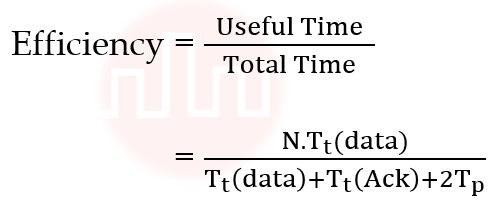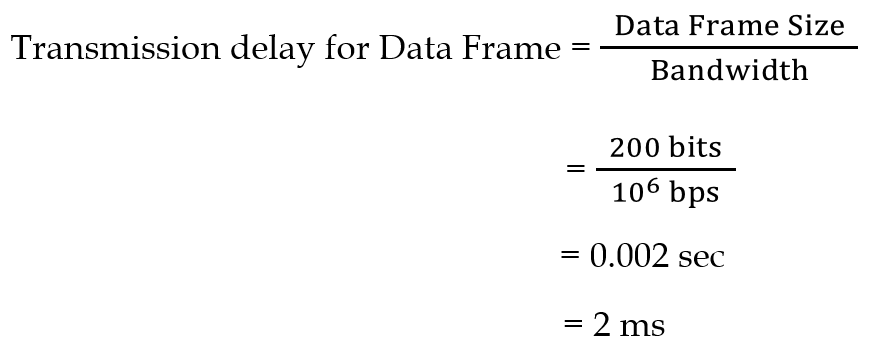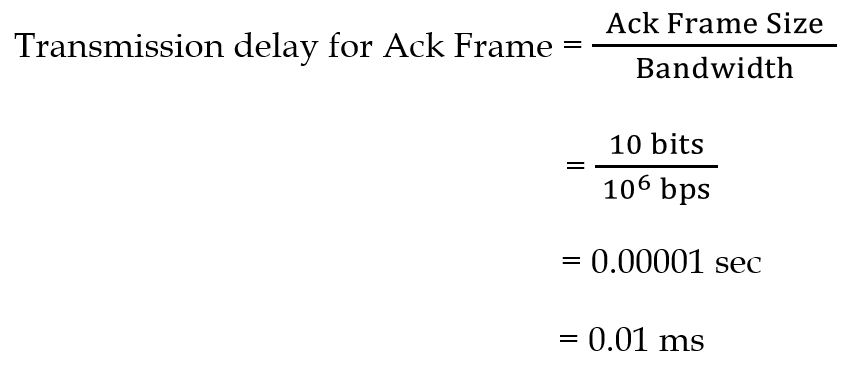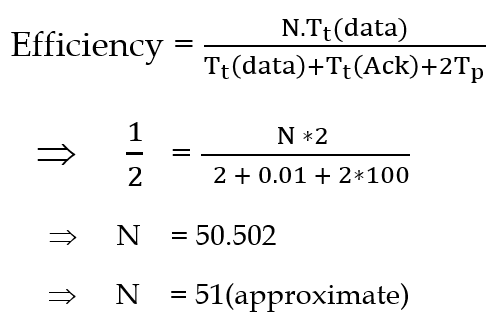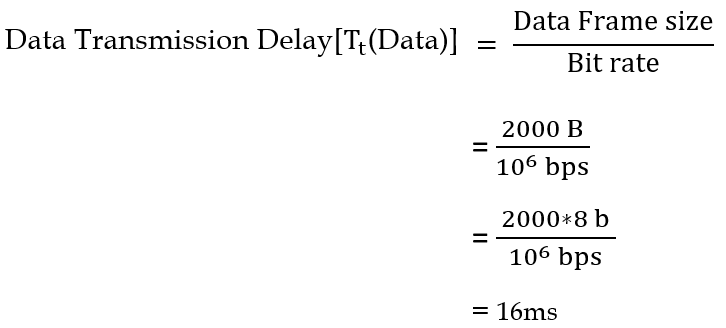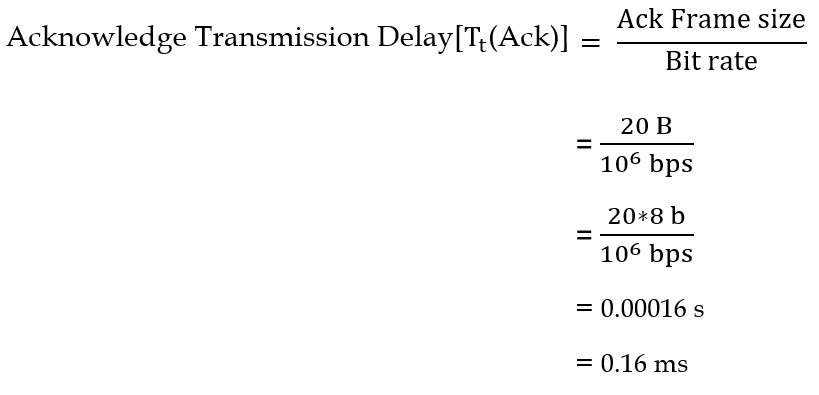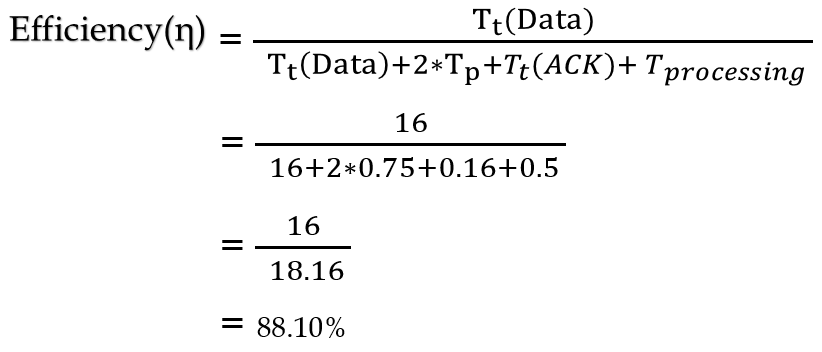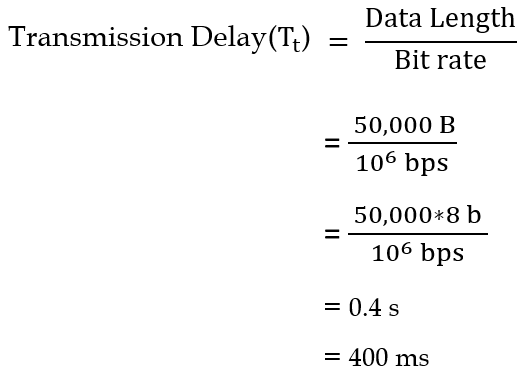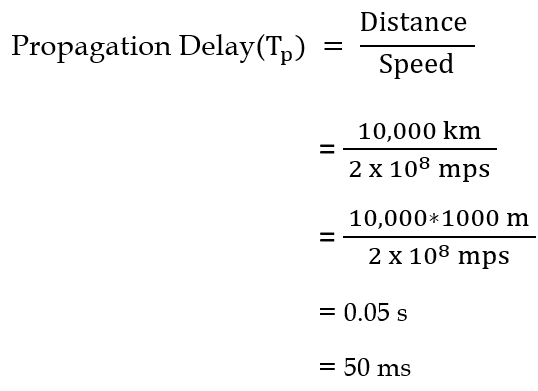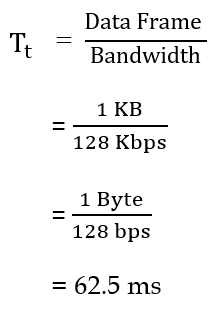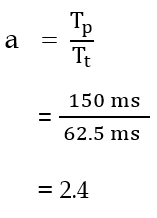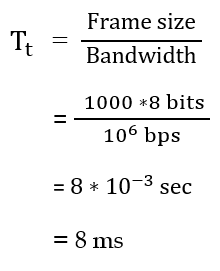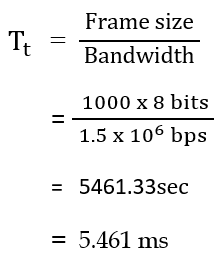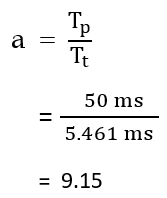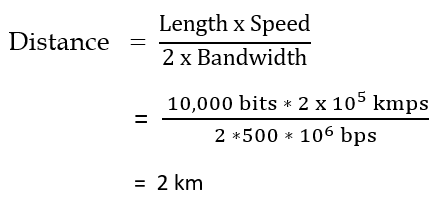GATE CSE Flow Control Computer Network
| Q1➡ | GATE 2021 Set-1 Consider the sliding window flow-control protocol operating between a sender and a receiver over a full-duplex error-free link. Assume the following: • The time taken for processing the data frame by the receiver is negligible. • The time taken for processing the acknowledgement frame by the sender is negligible. • The sender has an infinite number of frames available for transmission. • The size of the data frame is 2,000 bits and the size of the acknowledgment frame is 10 bits. • The link data rate in each direction is 1 Mbps (=106bits per second). • One way propagation delay of the link is 100 milliseconds. The minimum value of the sender’s window size in terms of the number of frames, (rounded to the nearest integer) needed to achieve a link utilization of 50% is _____. |
Show Answer With Best Explanation
| More Discussion | Explanation On YouTube | Computer Network | Help-Line |
| Q2➡ | GATE 2017 Set-1 The value of parameters for the Stop-and-Wait ARQ protocol are as given below: Bit rate of the transmission channel = 1 Mbps. Propagation delay from sender to receiver = 0.75 ms. Time to process a frame = 0.25 ms. Number of bytes in the information frame = 1980. Number of bytes in the acknowledge frame = 20. Number of overhead bytes in the information frame = 20. Assume that there are no transmission errors. Then, the transmission efficiency (expressed in percentage) of the Stop-and-Wait ARQ protocol for the above parameters is ________. (correct to 2 decimal places). |
Show Answer With Best Explanation
| More Discussion | Explanation On YouTube | Computer Network | Help-Line |
GATE CSE Flow Control Computer Network
| Q3➡ | GATE 2017 Set-2 Consider two hosts X and Y, connected by a single direct link of rate 106bits/sec. The distance between the two hosts is 10,000 km and the propagation speed along the link is 2×108m/sec. Host X sends a file of 50,000 bytes as one large message to host Y continuously. Let the transmission and propagation delays be p milliseconds and q milliseconds, respectively. Then the values of p and q are |
| i ➥ p=400 and q=50 |
| ii ➥ p=100 and q=50 |
| iii ➥ p=50 and q=400 |
| iv ➥ p=50 and q=100 |
Show Answer With Best Explanation
| More Discussion | Explanation On YouTube | Computer Network | Help-Line |
| Q4➡ | GATE 2016 Set-2 Consider a 128 × 103 bits/ second satellite communication link with one way propagation delay of 150 milliseconds. Selective retransmission (repeat) protocol is used on this link to send data with a frame size of 1 kilobyte. Neglect the transmission time of acknowledgement. The minimum number of bits required for the sequence number field to achieve 100% utilization is _________. |
Show Answer With Best Explanation
| More Discussion | Explanation On YouTube | Computer Network | Help-Line |
| Q5➡ | GATE 2015 Set-1 Suppose that the stop-and-wait protocol is used on a link with a bit rate of 64 kilobits per second and 20 milliseconds propagation delay. Assume that the transmission time for the acknowledgment and the processing time at nodes are negligible. Then the minimum frame size in bytes to achieve a link utilization of at least 50% is _________. |
Show Answer With Best Explanation
| More Discussion | Explanation On YouTube | Computer Network | Help-Line |
| Q6➡ | GATE 2015 Set-2 A link has a transmission speed of 106 bits/sec. It uses data packets of size 1000 bytes each. Assume that the acknowledgement has negligible transmission delay, and that its propagation delay is the same as the data propagation delay. Also assume that the processing delays at the nodes are negligible. The efficiency of the stop-and-wait protocol in this setup is exactly 25%. The value of the one-way propagation delay (in milliseconds) is ________. |
Show Answer With Best Explanation
| More Discussion | Explanation On YouTube | Computer Network | Help-Line |
| Q7➡ | GATE 2015 Set-3 Consider a network connected two systems located 8000 kilometers apart. The bandwidth of the network is 500 × 106 bits per second. The propagation speed of the media is 4 × 106 meters per second. It is needed to design a Go-Back-N sliding window protocol for this network. The average packet size is 107 bits. The network is to be used to its full capacity. Assume that processing delays at nodes are negligible. Then the minimum size in bits of the sequence number field has to be _________. |
Show Answer With Best Explanation
| More Discussion | Explanation On YouTube | Computer Network | Help-Line |
GATE CSE Flow Control Computer Network
| Q8➡ | GATE 2014 Set-1 Consider a selective repeat sliding window protocol that uses a frame size of 1 KB to send data on a 1.5 Mbps link with a one-way latency of 50 msec. To achieve a link utilization of 60%, the minimum number of bits required to represent the sequence number field is ________. |
Show Answer With Best Explanation
| More Discussion | Explanation On YouTube | Computer Network | Help-Line |
| Q9➡ | GATE 2013 Determine the maximum length of the cable (in km) for transmitting data at a rate of 500 Mbps in an Ethernet LAN with frames of size 10,000 bits. Assume the signal speed in the cable to be 2,00,000 km/s. |
| i ➥ 1 |
| ii ➥ 2 |
| iii ➥ 2.5 |
| iv ➥ 5 |
Show Answer With Best Explanation
| More Discussion | Explanation On YouTube | Computer Network | Help-Line |
GATE CSE Flow Control Computer Network

